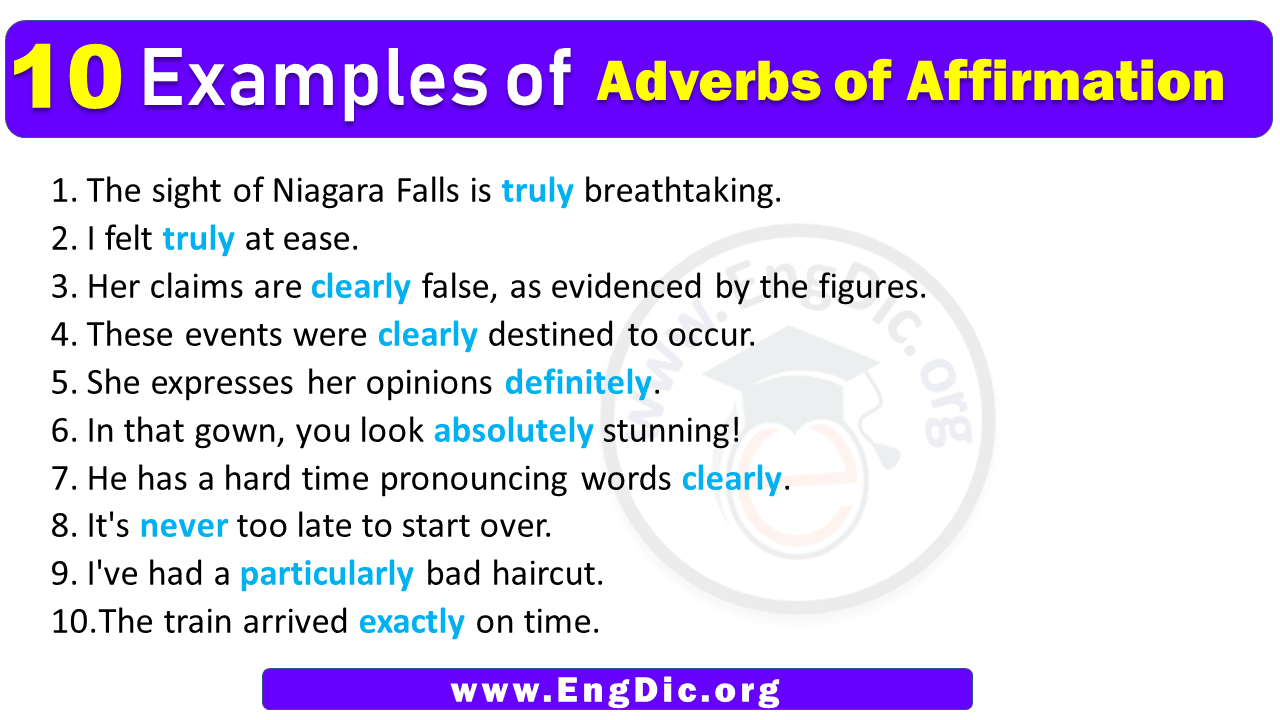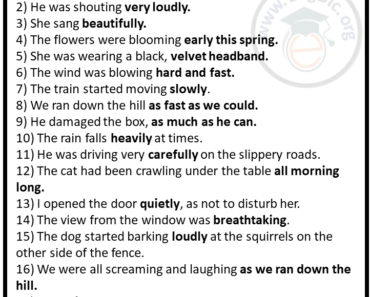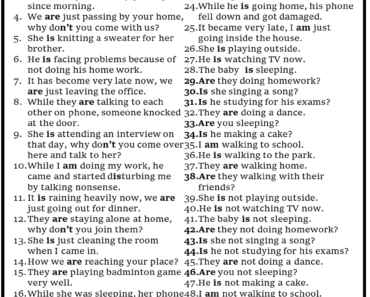Adverbs are an important part of the English language and can be used to add emphasis, tone, and clarity to sentences. Adverbs of affirmation and negation can be particularly powerful tools when it comes to expressing thoughts and emotions. In this article, we will take a look at 10 examples of adverbs of affirmation and negation in sentences. We’ll explore how they are used, their various forms, and why they are so effective when used correctly.
We’ll look at different contexts and examples from everyday conversations, literature, and more to discuss how adverbs can be used in sentences.
Adverbs of Affirmation
Adverbs of affirmation are used to express agreement, approval, or confirmation of something. Some common examples include:
1. Certainly: This adverb is used to express agreement with something or to indicate that something is true.
For example: “Certainly, I’ll help you with that.”
2. Definitely: This adverb is used to confirm or assert something without any doubt.
For example: “I definitely want to go on that trip.”
3. Absolutely: This adverb is used to show strong agreement or approval.
For example: “I absolutely agree with you.”
4. Surely: This adverb is used to express confidence or certainty about something.
For example: “Surely you can finish that project by the deadline.”
5. Indeed: This adverb is used to emphasize or confirm something that has been said.
For example: “The weather is beautiful today, indeed.”
6. Undoubtedly: This adverb is used to express certainty or conviction about something.
For example: “Undoubtedly, he is the best candidate for the job.”
7. Positively: This adverb is used to express agreement or certainty about something.
For example: “I positively believe we can achieve our goals.”
8. Absolutely: This adverb is used to express complete agreement or certainty about something.
For example: “I absolutely loved the movie.”
9. Naturally: This adverb is used to express agreement with something that is considered obvious or expected.
For example: “Naturally, I’ll take care of it for you.”
10. Definitely: This adverb is used to express strong agreement or confirmation.
For example: “I definitely agree with your proposal.”
10 Examples of Adverbs of Affirmation in Sentences
- The sight of Niagara Falls is truly breathtaking.
- Her claims are clearly false, as evidenced by the figures.
- She expresses her opinions definitely.
- In that gown, you look absolutely stunning!
- I’ve had a particularly bad haircut.
- The train arrived exactly on time.
- She undeniably has a talent for playing the guitar.
- Yes, I’m absolutely sure that we can complete the project on time.
- The concert was undoubtedly one of the best performances I’ve ever seen.
- The team positively worked together to overcome the challenges they faced.
Adverbs of Affirmation Exercise With Answers
Here are some sentences with adverbs of affirmation. The adverb is underlined, and the answer key is provided below.
- She certainly deserved the promotion.
- He absolutely aced the exam.
- They truly appreciate your help.
- We definitely want to go on vacation this year.
- I absolutely love this restaurant.
- She clearly explained the instructions.
- He definitely knows how to dance.
- They truly believe in their cause.
- We absolutely need to finish this project on time.
- She definitely has a talent for painting.
Answer key:
- certainly
- absolutely
- truly
- definitely
- absolutely
- clearly
- definitely
- truly
- absolutely
- definitely
Adverbs of Negation
Adverbs of negation are used to express the opposite of something or to deny or contradict something. Here are some examples:
1. Never: This adverb is used to express the absence of something or the lack of occurrence.
For example: “I never go to that restaurant.”
2. Not: This adverb is used to negate or deny something.
For example: “I am not going to the party tonight.”
3. Rarely: This adverb is used to indicate that something occurs very infrequently.
For example: “I rarely watch TV.”
4. Seldom: This adverb is used to indicate that something happens only occasionally.
For example: “He seldom goes to the gym.”
5. Neither: This adverb is used to indicate that two or more things are not true or applicable.
For example: “Neither of us likes seafood.”
6. No: This adverb is used to express a negative response or to deny something.
For example: “No, I haven’t seen that movie yet.”
7. Hardly: This adverb is used to indicate that something happens to a very small degree or almost never.
For example: “I hardly ever eat fast food.”
8. Scarcely: This adverb is used to indicate that something is in short supply or happens very rarely.
For example: “He scarcely spoke during the meeting.”
9. Barely: This adverb is used to indicate that something is just barely true or possible.
For example: “I barely passed the exam.”
10. Not at all: This adverb is used to express a complete denial or the complete absence of something.
For example: “I am not at all interested in going to that concert.”
10 Examples of Adverbs of Negation in Sentences
- He is not interested in playing soccer anymore.
- He rarely goes to the gym, despite his fitness goals.
- They hardly ever eat fast food, preferring to cook at home.
- I don’t particularly enjoy watching horror movies.
- She absolutely refuses to compromise on her values.
- He completely forgot about our meeting yesterday.
- She barely had time to finish her work before the deadline.
- He hardly knows anything about the topic, despite claiming to be an expert.
- They scarcely spoke during the entire trip, causing tension between them.
- I’m not really sure if I want to go to the party tonight.
Adverbs of Negation Exercise With Answers
Here are some sentences with adverbs of negation. The adverb is underlined, and the answer key is provided below.
- She never forgets her keys.
- He rarely eats fast food.
- They hardly ever arrive on time.
- We scarcely have enough time to finish the project.
- I barely passed the test.
- She didn’t fully understand the instructions.
- He hardly ever complains about anything.
- They don’t really care about the outcome.
- We almost never go to the movies.
- She rarely makes mistakes.
Answer key:
- never
- rarely
- hardly ever
- scarcely
- barely
- fully
- hardly ever
- really
- almost never
- rarely
Related: 100 Examples of Adverbs of Affirmation







